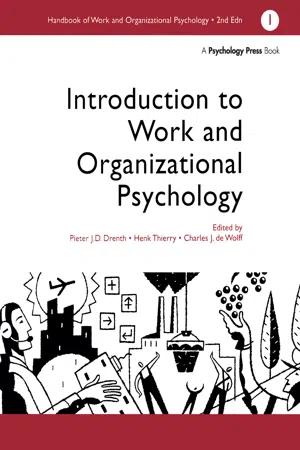Psychology
Industrial-Organizational Psychology
Industrial-Organizational Psychology is a field that applies psychological principles to the workplace. It focuses on areas such as employee selection, training, performance appraisal, and organizational development. Industrial-Organizational psychologists work to improve productivity, employee satisfaction, and overall well-being within work settings.
Written by Perlego with AI-assistance
Related key terms
12 Key excerpts on "Industrial-Organizational Psychology"
- eBook - ePub
Frameworks for Practice in Educational Psychology, Second Edition
A Textbook for Trainees and Practitioners
- Barbara Kelly, Lisa Marks Woolfson, James Boyle(Authors)
- 2016(Publication Date)
- Jessica Kingsley Publishers(Publisher)
The specialty of Industrial-Organizational Psychology (also called I/O psychology) is characterized by the scientific study of human behavior in organizations and the work place. The specialty focuses on deriving principles of individual, group and organizational behavior and applying this knowledge to the solution of problems at work. (APA 2016)It is significant to note that within the United States the field is referred to as industrial organisational psychology. Within the United Kingdom there are several terms used to describe the field, which include ‘organisational psychology’ and ‘work psychology’. The term chosen by the British Psychological Society (BPS) is ‘occupational psychology’. The BPS definition again has many similarities to the APA definition, and it states: ‘Occupational psychology is concerned with the performance of people at work and with how individuals, small groups and organisations behave and function. Its aim is to increase the effectiveness of the organisation and improve the job satisfaction of individuals’ (BPS 2016). For the purposes of this chapter I will continue to use the term ‘organisational psychology’, and the definition I will work to is that of the BPS. Having said this, when referring to the work of others, I will use the term that they have used.These definitions are both broad brush and give little understanding of the focus of organisational psychology. Riggio (2016) has provided four categories comprising the work of organisational psychologists. I have added a fifth category: - eBook - ePub
- Duane P. Schultz, Sydney Ellen Schultz(Authors)
- 2020(Publication Date)
- Routledge(Publisher)
Finding the kind of work that is compatible with your interests, skills, and temperament is among the most significant endeavors you will ever undertake. For that reason, this course in industrial-organizational (I-O) psychology may be the most personally relevant course of your college career. You will find that I-O psychology will have an impact on your future from the day you apply for your first job until the day you announce your retirement. The findings and practices of I-O psychologists, in conjunction with your own skills and motivation, will determine the positions for which you are hired, the way you are expected to perform your job duties, your rank and compensation, your ultimate level of responsibility, and the personal happiness you derive from your work.I-O PSYCHOLOGY ON THE JOB
I-O psychologists working in the area of human resources, or employee selection, help initially with the difficult task of choosing a job. Your first formal contacts with I-O psychology outside the classroom are likely to be with recruitment Web sites, application forms, interviews, psychological tests, and other employee selection measures. I-O psychologists have devised these selection measures to help employers determine whether you are the right person for their job and whether that job is the most suitable one for you.Your work helps to define your identity and contributes to your sense of self-esteem.After you have satisfied yourself and the organization that the position is appropriate, your advancement will depend on your performance in training programs and on the job. Your employer will use assessment criteria developed by I-O psychologists.Because of your college training, you will likely qualify for management positions within the corporate hierarchy. These jobs require you to be aware of and sensitive to the diverse motivational factors and personal concerns that affect the people who work for you. To learn how to lead and to motivate your subordinates to put forth their best efforts, you will need to understand the findings of I-O psychologists on these factors. - eBook - ePub
- Carrie A. Bulger, Duane P. Schultz, Sydney Ellen Schultz(Authors)
- 2020(Publication Date)
- Routledge(Publisher)
In addition to the tragic physical and personal consequences of industrial accidents, economic losses cost organizations billions of dollars in lost work hours, employee compensation, and the expense of hiring and training new workers. Because most accidents are caused by human error, the work of I–O psychologists is crucial in reducing the accident toll. Psychologists are also involved in efforts to deal with alcohol and drug use on the job and with violence in the workplace.Stress in the Workplace (Chapter 13)Job-induced stress has widespread effects on physical and mental health. Stress can interfere with job performance and lead to serious illness. Many organizations attempt to deal with the effects of stress through counseling programs and by redesigning jobs to be less stressful.Engineering Psychology (Chapter 14)The design of the tools and equipment needed to perform a job is directly related to the physical work environment, to employee motivation and morale, and to job safety. As the machinery of the manufacturing, transportation, and service industries becomes more complex, so do the demands placed on the human operators of the equipment. The job of the engineering psychologist is to ensure the best working relationship between person and machine by taking account of the strengths and weaknesses of both.Consumer Psychology (Chapter 15)The work of consumer psychologists is important to you if you are employed by a company that manufactures and sells consumer products and services, and if you want to be a smart and informed buyer. Psychologists are involved in defining the markets for consumer goods, determining the effectiveness of advertising campaigns, and analyzing the motivations and needs of the buying public.Summary
Work provides a sense of personal identity, defines social status, contributes to self-esteem, and satisfies the need for belonging to a group. Industrial–organizational (I–O) psychology - Irving B. Weiner, Neal W. Schmitt, Scott Highhouse(Authors)
- 2012(Publication Date)
- Wiley(Publisher)
Part I Conducting and Communicating Research in Industrial–Organizational PsychologyPassage contains an image Chapter 1 A Snapshot in Time: Industrial–Organizational Psychology Today Scott Highhouse and Neal W. Schmitt
Author Note: We are very grateful to the following people who took the time to provide their thoughtful contributions to this chapter: Herman Aguinis, Clay Alderfer, Neal Anderson, Talya Bauer, Terry Beehr, David Chan, Dave Day, Kevin Ford, John Hazer, Chuck Hulin, Steve Kozlowski, Ron Landis, Joel Lefkowitz, Mike McDaniel, Fred Oswald, Rob Ployhart, Bob Pritchard, Chuck Reeve, Bob Sinclair, Paul Spector, Donald Truxillo, Jeff Vancouver, Bob Vandenberg, and Fran Yammarino.“I” Versus “O” Tension Psychology Versus Business Tension Science Versus Practice Tension Conclusion ReferencesAs we write this chapter, the field of industrial–organizational psychology in the United States has survived its third attempt at a name change. To provide a little perspective, the moniker industrial psychology became popular after World War I, and described a field that was characterized by ability testing and vocational assessment (Koppes, 2003). The current label, industrial–organizational (I-O) psychology, was made official in 1973. The addition of organizational reflected the growing influence of social psychologists and organizational development consultants, as well as the intellectual and social milieu of the period (see Highhouse, 2007). The change to I-O psychology was more of a compromise than a solution—which may have succeeded only to the extent that everyone was equally dissatisfied. The first attempt to change this clunky label, therefore, occurred in 1976. Popular alternatives at the time were personnel psychology, business psychology, and psychology of work. The leading contender, however, was organizational psychology- Steven G. Rogelberg(Author)
- 2016(Publication Date)
- SAGE Publications, Inc(Publisher)
The rapid industrialization of the 1950s and 1960s created the need for better understanding of the psychology of the workplace; worker, production, and organizational efficiency; and labor management relations. Areas that received attention at this time were job attitudes, work incentives, absenteeism, and job satisfaction (Ganguli, 1961). One of the major centers for psychological research was the Ahmedabad Textile Industry Research Association (ATIRA), which was established in 1950. Well-known psychologists such as Erik Erikson, David McClelland, and A. K. Rice were frequent visitors to this institute where several large-scale surveys were conducted to study psychological issues related to the textile industry. Rice did some of his pioneering work in industrial psychology in India in 1955 using the sociotechnical approach in an experimental automatic loom shed here. A survey by Durganand Sinha in 1972 showed that while only 25 studies were done in the field of industrial psychology until independence in 1947, as many as 508 studies were done from 1948 to 1969. Two major areas that accounted for the bulk of the studies were performance and job satisfaction (139 studies), and management and organization (128 studies). Other areas studied were occupational choice and guidance; selection and placement; training, task, and work analysis; special environment; advertising and consumer psychology; engineering psychology; driving and safety; and surveys and general studies. This review also noted that research in industrial psychology had an academic focus possibly because of the absence of contact between academic psychologists, the research they produced, and other organizations.The early 1960s saw initiation of formal management education in the country with the setting up of two Indian Institutes of Management, at Ahmedabad and Calcutta, which had separate areas of study called organizational behavior and behavioral sciences, which provided the impetus for organizational psychology.The latest survey found the focus of I-O psychology shifting to motivation, leadership, and human performance (Kanungo & Misra, 2004). Some trends toward indigenization and cross-cultural psychology were, however, discernible.Industrial/organizational psychology in India seems to continue to evolve in keeping with the broad socioeconomic situation in the country and also staying in touch with global trends.Singapore
Singapore, with a population of more than 4 million, is an urban city-state. Eighty-five percent of Singaporeans live in public flats, of which 94% are owner occupied. The major components of Singapore’s gross domestic product by industry as of 2004 were manufacturing, wholesale and retail, transport and communications, business services, other goods industries, and financial services. Singapore is therefore a setting in which I-O psychologists can make major contributions.- eBook - ePub
Work and Occupational Psychology
Integrating Theory and Practice
- Lara Zibarras, Rachel Lewis(Authors)
- 2013(Publication Date)
- SAGE Publications Ltd(Publisher)
Part I
Introduction to work and Occupational Psychology
Passage contains an image
1 What is Occupational Psychology? Lara Zibarras and Rachel LewisLearning outcomes On completion of this chapter you should:- have an overview of the history of Occupational Psychology in the UK;
- understand the key changes that have taken place in the work environment over the 20th century and into the 21st century;
- understand what Occupational Psychology is today, with an overview of the broad areas covered;
- appreciate how Occupational Psychology differs from other areas, such as human resources and management consultancy.
Introduction
The area of applied psychology relating to people at work and in organisations has a number of different labels. Within the UK we generally tend to use the term Occupational Psychology . This is the official title and is protected by law. However, you may also come across the labels Organisational Psychology, Business Psychology or Work Psychology . Elsewhere, such as in Europe, it is common convention to use the term Work Psychology ; while in the USA, it is commonly labelled Industrial and Organisational Psychology (or I/O Psychology ).So, what is Occupational Psychology? Broadly speaking, it is the branch of applied psychology concerned with human behaviour in work and organisational settings. As defined by the British Psychological Society (BPS), Occupational Psychology is about applying the science of psychology to people at work ; where work is generally considered to be paid employment. That said, some researchers and practitioners have increasingly been exploring the links between work and non-work, such as the increasing blurring of boundaries between work and non-work hours (Brough and O’Driscoll, 2010).In this chapter, we first explore the history of Occupational Psychology from its inception during the early part of the 20th century, through to modern day Occupational Psychology. Next, we consider some ways in which the work environment has changed during the latter part of the 20th century and the early 21st century, and the influence this might have had on Occupational Psychology. Finally we consider some key ways in which Occupational Psychology might differ from other, seemingly similar, areas. - Lynne J Millward(Author)
- 2005(Publication Date)
- SAGE Publications Ltd(Publisher)
Recently there has been much debate about whether the British Psychological Society’s (BPS) Division of Occupational Psychology (DOP) should change its name (Brotherton, 1996). This debate is underpinned by the argument that the term ‘occupational psychology’ no longer reflects the activities in which practitioners are engaged. However, no clear name preference has yet been agreed by members of the Division. The equivalent role in Europe is known as ‘work and organizational psychology’ and in the USA as ‘industrial and organizational psychology’.The BPS recognizes that the remit of the occupational psychologist is broad, overlapping with other fields such as management science, organizational science and human resource management. The work undertaken by occupational psychologists is listed as follows (BPS, 2004):- Organizational development consultancy
- eBook - ePub
A Handbook of Work and Organizational Psychology
Volume 1: Introduction to Work and Organizational Psychology
- Charles, De, Wolff, P J D Drenth, THIERRY HENK(Authors)
- 2018(Publication Date)
- Psychology Press(Publisher)
individual (and therefore to individual differences), such as selection, performance assessment, designing a career plan, support and advice in case of difficulties, etc. In other subject areas, however, individual differences among those employed remain a little more in the background and attention is focused on the behaviour of what we wish to call “sets” of people. Such a set may have the characteristics of a group, defined in a social-psychological sense—such as semi-autonomous or self-steering units in a company—but this is not necessarily the case. Consider topics such as (re)designing work tasks, enhancing productivity, flexibilizing employment conditions, reducing the chance of stress. The common element in human behaviour, then, is for example their position as employees in a work organization, the fact that they come under the same Collective Labour Agreement, or that they attend the same course or take the same training. It is true that work and organizational psychologists are concerned with human behavioural characteristics in relation to these topics, but not (primarily) with individual differences.Second, we have the concept of employment or work. In a strict sense, work refers to the activities someone performs based on his or her position in a work organization and entitle him/her to an income or another financial recompense. This context applies to most topics in work and organizational psychology. But in addition, an increasing amount of interest has developed for topics relating to other forms of work. For example, it is important to know what interests and objectives pupils consider concerning their first position, how entrants to the labour market are made fully aware of the standards and values in their first company (socialization), how people suddenly confronted with dismissal can be motivated by devoting themselves to new challenges, how the elderly are prepared for the time in which they no longer have a job, and so on. More and more people will also (have to) adjust themselves to having more than one career, constant further training and retraining and using leisure time meaningfully during intermediate “jobless” periods.The third aspect, behaviour at work in or in connection with a work organization - eBook - ePub
Organizational Psychology
A Scientist-Practitioner Approach
- Steve M. Jex, Thomas W. Britt(Authors)
- 2014(Publication Date)
- Wiley(Publisher)
Based on most historical accounts of the development of the field of I/O psychology, the industrial side of the field was much quicker to develop than the organizational side. Chronologically, the beginnings of the field of I/O psychology can be traced to work in the United States, during the early part of the 20th century, by pioneers such as Hugo Munsterberg, Walter Dill Scott, and Walter Bingham (Vinchur & Koppes, 2011). The application of psychology to the workplace at that time was also beginning to occur simultaneously in Europe.In the United States most of the work at that time dealt with topics such as skill acquisition and personnel selection, while there was very little attention given to the organizational side of the field. This was not, however, the case in other parts of the world at the beginning of the 20th century. In Great Britain, for example, H. M. Vernon, who is acknowledged as one of that country's first industrial psychologists, investigated such topics as industrial fatigue, accidents, the impact of long work hours, and worker efficiency. Fatigue of employees was also of interest to psychologists in Australia, most notably Bernard Muscion. Most of these topics are today considered part of the organizational side of the field, and in fact part of the recently emerging field of Occupational Health Psychology (see Chapter 7).People Behind the Research
Laura Koppes Bryan
While teaching my first introductory to industrial and organizational (I-O) psychology course, I would spend the first two classes reviewing the history of the discipline. I believe that knowing our history deepens our understanding and broadens our perspectives when teaching, practicing, or researching I-O psychology. One day, while using a typical textbook, I presented the “fathers” of I-O psychology. There are different opinions about the original founders, but frequently cited individuals include Hugo Munsterberg and Walter Dill Scott. While writing the word “fathers” on the chalkboard, it occurred to me that I had not read any historical accounts of I-O psychology that included women who may have been involved early in the discipline. This observation led to over a decade of research, looking for women psychologists who contributed to I-O psychology during its inception.It was unusual for a tenure-track faculty member early in her career to study history. In fact, one tenured professor told me to quit the research because it would jeopardize my tenure decision. He wanted me to conduct traditional empirical research. He said that only senior level professionals later in their careers are interested in history. Because I highly valued knowing our historical roots and desired to provide a more complete historical account, I ignored the advice and continued my research. I immediately contacted Frank Landy, who was known for his historiography of I-O psychology during the early years of the discipline. I asked him if he came across women psychologists in his research. These women were not his focus so he was not sure, but encouraged me to continue the research. He then mentored me on how to study archival material. We visited the Northwestern University archives while researching Walter Dill Scott and the Scott Company. During this trip, I found Mary Holmes Stevens Hayes, who was the only consulting psychologist working for the Scott Company. I traced her to the National Archives because she had a very successful career of applying psychology to solve problems while working for the federal government. - eBook - ePub
The Psychology of Behaviour at Work
The Individual in the Organization
- Adrian Furnham(Author)
- 2012(Publication Date)
- Psychology Press(Publisher)
Much of the objection to the human relations perspective has been initiated by modern behavioural scientists who are interested in many of the same phenomena. Behavioural scientists are concerned with the systematic analysis of human behaviour and take pride in the objectivity with which they approach their subject and their adherence to the conventional methods of experimental science. They also view their research as interdisciplinary in character and realize that it is often difficult, if not impossible, to understand the sociology of a group separate from the psychology of the individuals comprising it and the anthropology of the culture within which it exists. However, there have been few subsequent studies, of whatever scientific quality, that have had such an influence on work psychology thinking (Duncan, 1978).Integrating the different perspectivesThis history of organizational psychology and work psychology can be approached in different ways through different perspectives. It is important to emphasize that these histories are complementary rather than contradictory.The history of work psychology can probably be usefully thought of as falling into three categories. From the turn of the twentieth century until the beginning of the Second World War, work psychology was termed “scientific management” or industrial psychology. In this period, workers were thought of as factory hands. Both management and employees were thought of in rational economic terms. The idea that scientific principles could be applied to the world of work (especially management and ergonomics) was new, but the great thinkers of the day – Fayol, Taylor and Weber – all stressed this. They all believed that, by following relatively straightforward explicit principles, organizations could become more efficient. All the writing in this early period emphasized structure, order, logic and rules.The industrial psychologists of the day certainly saw their job as increasing efficiency. The image of the time-and-motion psychologist hiding in the cupboard spying on workers probably arose at that time. The work psychology researchers and psychologists of the day certainly “took the side of management”: they were not interested in occupational fatigue out of compassion for the workers, but rather how to ensure the most cost-efficient production from those workers. Yet it would be unfair to the thinkers and researchers of this first period to argue that they were not concerned with worker welfare. In hindsight it may seem patronizing, but many large companies took a genuine interest in the health and living standards of their workers. - eBook - ePub
- (Author)
- 2012(Publication Date)
- Wiley(Publisher)
In the past 10–15 years, we have had to address new aspects of organizational behavior about which we had little knowledge. The depth and magnitude of these issues in the psychology of work have had a profound impact on the profession of I-O psychology. (p. 295)Increasing diversity of the U.S. population, resulting in a workforce diverse in gender, age, ethnicity, race, and culture, has impacted I-O psychology in recent years. Diversity in the workforce can partially be attributed to a global marketplace, because multinational organizations are hiring employees from an international labor market. A diverse workforce has implications for both practice and research in I-O psychology (see Triandis, Kurowoski, & Gelfand, 1994). For example, organizations need to identify ways to individualize reward systems and recruit and retain diverse employees. Theories, research methods, and applications will need to include consideration of age, gender, ethnicity, race, and culture. New topics areas for I-O psychologists have emerged in recent years (e.g., acquisitions/mergers, employee retention, work/family balance) and traditional issues have been revisited (e.g., job analysis, selection, training and development, performance appraisal) (Cascio, 1995).Business and Technology Forces
Organizations must change their structures, technologies, and processes and adapt to their environments to survive (Huber, 1984). Because I-O psychologists historically responded to business problems (e.g., Baritz, 1960), changes in business directly affected the field. I-O psychologists provided employers with techniques and information for implementing an explicit scientific approach and for helping employers make decisions (Dipboye et al., 1994).The Industrial Revolution at the end of the 19th century contributed to a prevailing faith in capitalism (Katzell & Austin, 1992). Primary business objectives were to improve efficiency, increase productivity, and decrease costs through standardization and simplification (Dipboye et al., 1994). Scientific management advocates addressed these objectives by designing work to improve efficiency (Taylor, 1911/1947). Frederick Taylor, an industrial engineer and manager, was interested in worker productivity and improving efficiencies. He labeled his procedures as scientific management because of an emphasis on the scientific method and quantitative measures used to assess changes (Taylor, 1911/1947). Viteles (1932) noted that although Taylor's ideas were initially accepted, his work was criticized for not giving consideration to employees' perspectives and well-being. In contrast, Frank and Lillian Gilbreth, known for their time-and-motion studies, were more concerned with individual needs in work settings. They believed that scientific management was more than machines, tools, procedures, and inventory control: “It meant, first of all, the people - eBook - ePub
The SAGE Handbook of Industrial, Work & Organizational Psychology
V3: Managerial Psychology and Organizational Approaches
- Deniz S Ones, Neil Anderson, Chockalingam Viswesvaran, Handan Kepir Sinangil(Authors)
- 2015(Publication Date)
- SAGE Publications Ltd(Publisher)
Throughout the history we describe, IWO psychologists have worked with multiple constituencies in the workplace – employers, but also employees, labor unions, government agencies, the unemployed, and the retired. Throughout its history, topics of interest to management, namely productivity and efficiency, have been primary. Research topics of primary interest to employees, such as safety and satisfaction, have had less interest paid by IWO psychologists and the interest seems focused on relationships to productivity-efficiency. Is there a possibility of a rapprochement?A broad example of preference for a management perspective has to do with personnel selection. Researchers have been interested in helping companies choose the best employees for a particular opening. Pre-employment tests are one of the most lucrative aspects of our field. Conversely, early applied psychologists were interested in vocational testing, helping people choose optimal occupations based on their skill set and interests. This is personnel selection from the employee perspective. Over time, however, this research was ceded to counseling psychologists and now such research on vocational interests is rarely conducted by IWO psychologists. Workforce development, another ripe topic, is an acknowledgment of the importance of human capital for individuals. Recall that Cronbach and Gleser (1965) identified two perspectives for decision theory, namely the individual and the institution-organization.Recently, there has been a resurgence in employee-focused topics within IWO psychology. Topics such as stress, work–family balance, workplace harassment, and abusive supervision are all popular. There is a danger, though, that these topics will be ceded to occupational health psychologists who will develop their own conferences, journals, and societies that become isolated from traditional IWO psychology topics. In addition, it should be noted that Canadian IWO psychology has developed a higher percentage of scholars who have focused on topics not dictated by a management agenda. Leading scholars in OHP as well as the psychological aspects of unionization have thrived in Canada. Using the lessons from history's past, we need to be aggressive in making sure that OHP-focused researchers remain within the core of IWO psychology (as well as connecting with their own specialty areas). A specialization of human factors, consumer, and military psychology into separate APA divisions might repeat itself, based on institutional factors. In addition, training encounters parallel disciplines in Human Resource Development and Instructional Systems Design.
Learn about this page
Index pages curate the most relevant extracts from our library of academic textbooks. They’ve been created using an in-house natural language model (NLM), each adding context and meaning to key research topics.











